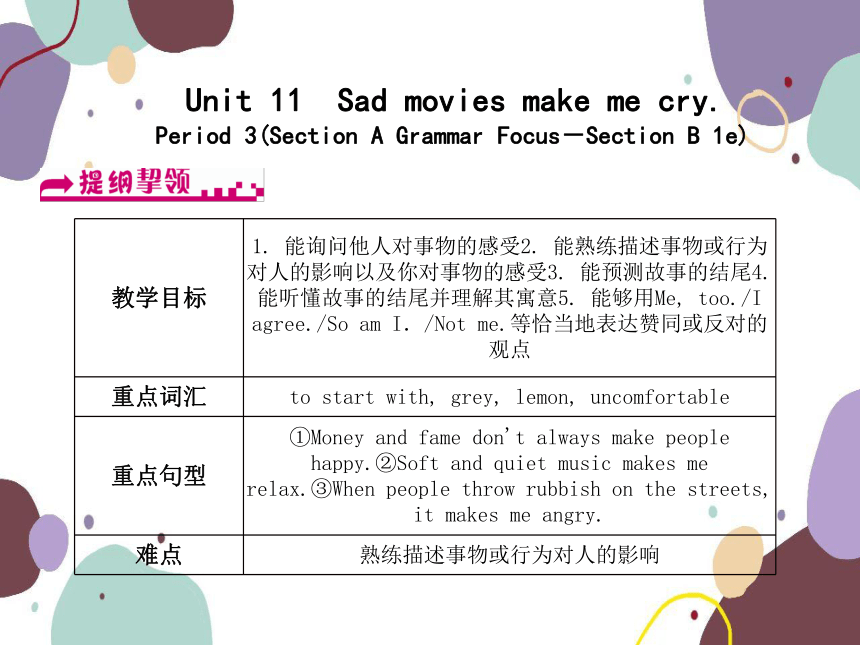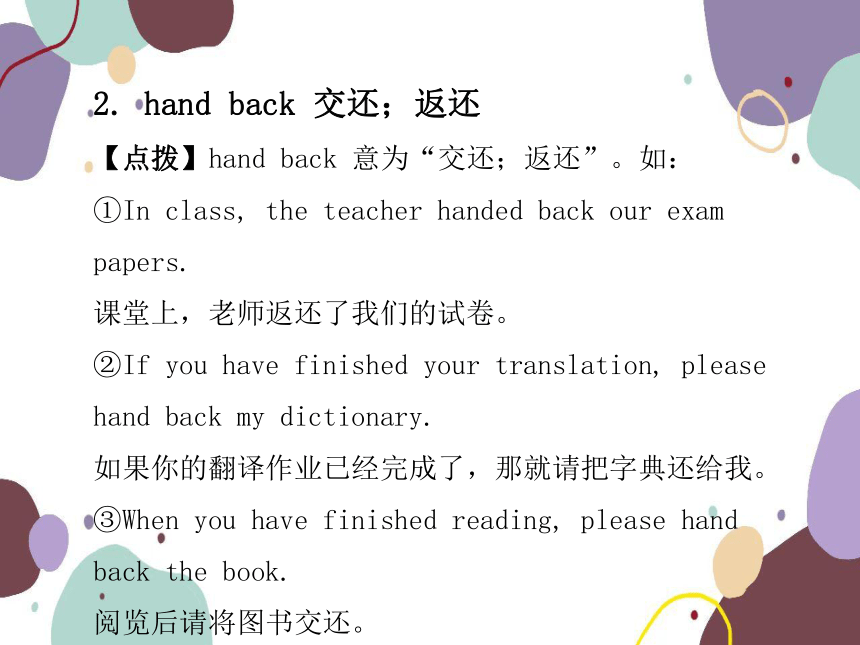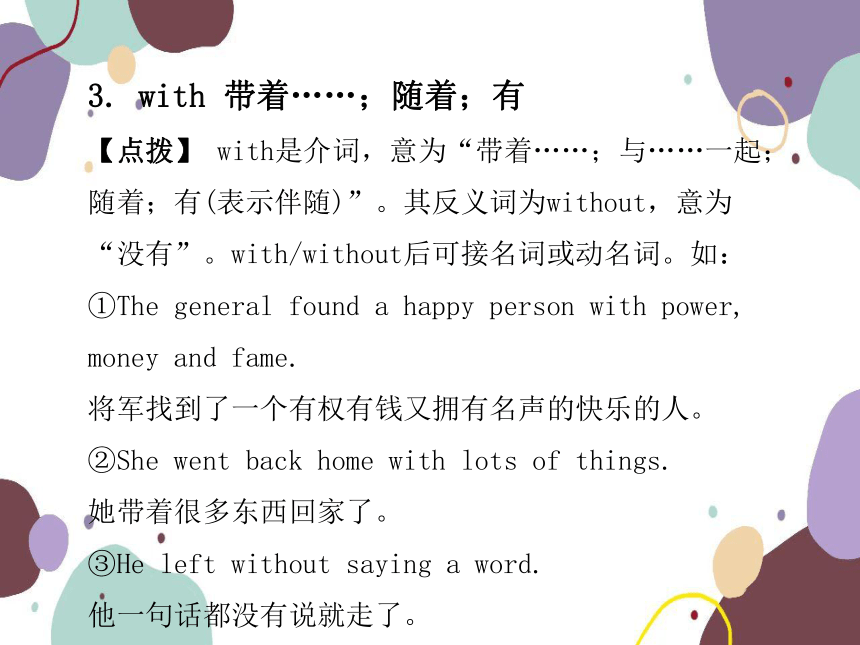人教版九年级全册Unit 11Sad movies make me cry.(Section A Grammar Focus-Section B 1e)课件(共10张PPT)
文档属性
| 名称 | 人教版九年级全册Unit 11Sad movies make me cry.(Section A Grammar Focus-Section B 1e)课件(共10张PPT) |  | |
| 格式 | pptx | ||
| 文件大小 | 214.0KB | ||
| 资源类型 | 教案 | ||
| 版本资源 | 人教新目标(Go for it)版 | ||
| 科目 | 英语 | ||
| 更新时间 | 2022-10-22 15:34:22 | ||
图片预览





文档简介
(共10张PPT)
Unit 11 Sad movies make me cry.
Period 3(Section A Grammar Focus-Section B 1e)
教学目标 1. 能询问他人对事物的感受2. 能熟练描述事物或行为对人的影响以及你对事物的感受3. 能预测故事的结尾4. 能听懂故事的结尾并理解其寓意5. 能够用Me, too./I agree./So am I./Not me.等恰当地表达赞同或反对的观点
重点词汇 to start with, grey, lemon, uncomfortable
重点句型 ①Money and fame don't always make people happy.②Soft and quiet music makes me relax.③When people throw rubbish on the streets, it makes me angry.
难点 熟练描述事物或行为对人的影响
1. to start with起初;开始时
【点拨】to start with是动词不定式短语,意为“起初;开始时”,常用作状语,相当于to begin with。如:
①To start with, it was cloudy and grey, and cloudy days make me sad.
起初,天气多云、昏暗,多云天让我感到悲伤。
②To start with, things were not so smooth, but later the situation was getting better and better.
刚开始时,事情不太顺利,但是后来形势越来越好了。
③You must pass the exam, to start with.
首先,你必须通过考试。
【延伸】start with相当于begin with,意为“以……开始;从……着手;将……作为开头”,直接作谓语。如:
The article starts/begins with a question.
这篇文章以一个问题作为开始。
2. hand back 交还;返还
【点拨】hand back 意为“交还;返还”。如:
①In class, the teacher handed back our exam papers.
课堂上,老师返还了我们的试卷。
②If you have finished your translation, please hand back my dictionary.
如果你的翻译作业已经完成了,那就请把字典还给我。
③When you have finished reading, please hand back the book.
阅览后请将图书交还。
3. with 带着……;随着;有
【点拨】 with是介词,意为“带着……;与……一起;随着;有(表示伴随)”。其反义词为without,意为“没有”。with/without后可接名词或动名词。如:①The general found a happy person with power, money and fame.
将军找到了一个有权有钱又拥有名声的快乐的人。
②She went back home with lots of things.
她带着很多东西回家了。
③He left without saying a word.
他一句话都没有说就走了。
1. The general cannot find a happy person and the king remains unhappy forever.
那位将军没能找到一位快乐的人,于是国王永远不开心。
【点拨】remain作连系动词时,意为“保持;仍是”,后接形容词、名词、分词或介词短语作表语。如:
①The man remained silent.
这个男人保持沉默。
②All the guests had arrived, but she remained sitting at the desk reading.
客人们都来了,但她还坐在写字台旁读书。
【延伸】remain还可作不及物动词,意为“剩下;停留;遗留”,此时不能用于进行时,也不能用于被动语态。如:
①A few pears remain on the trees.
树上还剩下几个梨。
②She remained in her office all afternoon.
她整个下午都待在办公室里。
2. The general searched for three days and found a happy person.
那位将军搜寻了三天,找到了一位快乐的人。
【点拨】search for意为“搜寻;找寻”,后面的宾语是寻找的目标。如:
The police searched for the lost boy yesterday.
警察昨天在寻找那个走丢的男孩。
【延伸】search还可作及物动词,后接地点或物品时,意为“搜查某处或某物”;后面跟人时,指“搜某人的身”。
如:
He searched his pockets, but found nothing.
他翻了翻口袋,但什么也没找到。
【辨析】search for, search, find与look for
(1)search for意为“搜寻;寻找”,后接搜寻的具体目标。
(2)search意为“搜查”,后接搜寻的范围。
(3)find意为“找到;发现”,后接找到的人或物,强调结果。
(4)look for意为“寻找”,后接寻找的人或物,强调动作。如:
①The policeman is searching for the thief.
那位警察正在搜寻那个小偷。
②The policeman is searching the house.
那位警察正在搜查那所房子。
③I looked everywhere for my book, but I couldn't find it.
我到处找我的书,但没能找到。
Unit 11 Sad movies make me cry.
Period 3(Section A Grammar Focus-Section B 1e)
教学目标 1. 能询问他人对事物的感受2. 能熟练描述事物或行为对人的影响以及你对事物的感受3. 能预测故事的结尾4. 能听懂故事的结尾并理解其寓意5. 能够用Me, too./I agree./So am I./Not me.等恰当地表达赞同或反对的观点
重点词汇 to start with, grey, lemon, uncomfortable
重点句型 ①Money and fame don't always make people happy.②Soft and quiet music makes me relax.③When people throw rubbish on the streets, it makes me angry.
难点 熟练描述事物或行为对人的影响
1. to start with起初;开始时
【点拨】to start with是动词不定式短语,意为“起初;开始时”,常用作状语,相当于to begin with。如:
①To start with, it was cloudy and grey, and cloudy days make me sad.
起初,天气多云、昏暗,多云天让我感到悲伤。
②To start with, things were not so smooth, but later the situation was getting better and better.
刚开始时,事情不太顺利,但是后来形势越来越好了。
③You must pass the exam, to start with.
首先,你必须通过考试。
【延伸】start with相当于begin with,意为“以……开始;从……着手;将……作为开头”,直接作谓语。如:
The article starts/begins with a question.
这篇文章以一个问题作为开始。
2. hand back 交还;返还
【点拨】hand back 意为“交还;返还”。如:
①In class, the teacher handed back our exam papers.
课堂上,老师返还了我们的试卷。
②If you have finished your translation, please hand back my dictionary.
如果你的翻译作业已经完成了,那就请把字典还给我。
③When you have finished reading, please hand back the book.
阅览后请将图书交还。
3. with 带着……;随着;有
【点拨】 with是介词,意为“带着……;与……一起;随着;有(表示伴随)”。其反义词为without,意为“没有”。with/without后可接名词或动名词。如:①The general found a happy person with power, money and fame.
将军找到了一个有权有钱又拥有名声的快乐的人。
②She went back home with lots of things.
她带着很多东西回家了。
③He left without saying a word.
他一句话都没有说就走了。
1. The general cannot find a happy person and the king remains unhappy forever.
那位将军没能找到一位快乐的人,于是国王永远不开心。
【点拨】remain作连系动词时,意为“保持;仍是”,后接形容词、名词、分词或介词短语作表语。如:
①The man remained silent.
这个男人保持沉默。
②All the guests had arrived, but she remained sitting at the desk reading.
客人们都来了,但她还坐在写字台旁读书。
【延伸】remain还可作不及物动词,意为“剩下;停留;遗留”,此时不能用于进行时,也不能用于被动语态。如:
①A few pears remain on the trees.
树上还剩下几个梨。
②She remained in her office all afternoon.
她整个下午都待在办公室里。
2. The general searched for three days and found a happy person.
那位将军搜寻了三天,找到了一位快乐的人。
【点拨】search for意为“搜寻;找寻”,后面的宾语是寻找的目标。如:
The police searched for the lost boy yesterday.
警察昨天在寻找那个走丢的男孩。
【延伸】search还可作及物动词,后接地点或物品时,意为“搜查某处或某物”;后面跟人时,指“搜某人的身”。
如:
He searched his pockets, but found nothing.
他翻了翻口袋,但什么也没找到。
【辨析】search for, search, find与look for
(1)search for意为“搜寻;寻找”,后接搜寻的具体目标。
(2)search意为“搜查”,后接搜寻的范围。
(3)find意为“找到;发现”,后接找到的人或物,强调结果。
(4)look for意为“寻找”,后接寻找的人或物,强调动作。如:
①The policeman is searching for the thief.
那位警察正在搜寻那个小偷。
②The policeman is searching the house.
那位警察正在搜查那所房子。
③I looked everywhere for my book, but I couldn't find it.
我到处找我的书,但没能找到。
同课章节目录
- Unit 1 How can we become good learners.
- Section A
- Section B
- Unit 2 I think that mooncakes are delicious!
- Section A
- Section B
- Unit 3 Could you please tell me where the restroom
- Section A
- Section B
- Unit 4 I used to be afraid of the dark.
- Section A
- Section B
- Unit 5 What are the shirts made of?
- Section A
- Section B
- Review of Units 1-5
- Unit 6 When was it invented?
- Section A
- Section B
- Unit 7 Teenagers should be allowed to choose their
- Section A
- Section B
- Unit 8 It must belong to Carla.
- Section A
- Section B
- Unit 9 I like music that I can dance to.
- Section A
- Section B
- Unit 10 You're supposed to shake hands.
- Section A
- Section B
- Review of Units 6-10
- Unit 11 Sad movies make me cry.
- Section A
- Section B
- Unit 12 Life is full of the unexpected
- Section A
- Section B
- Unit 13 We're trying to save the earth!
- Section A
- Section B
- Unit 14 I remember meeting all of you in Grade 7.
- Section A
- Section B
- Review of Units 11-14
